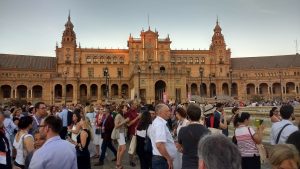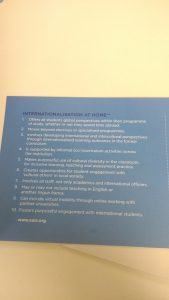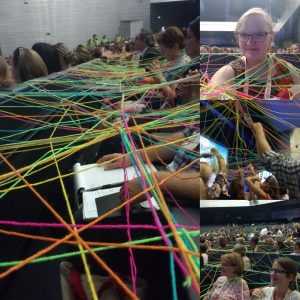Intercultural competences, multicultural interaction skills, call it by any name, but still it’s all about how a person can act in a global world.
European Association of International Education (EAIE) has a yearly conference of over 6000 participants and I had the pleasure of giving a speech there this year in Seville in September. EAIE is a meeting point for higher education institutions looking for partnerships, marketing their international programmes, and most importantly for us, for teachers, researchers and developers interested in international affairs. Five-day conference is full of exposition excitement, workshops and wonderful speakers, and it gave me a lot of new energy for student advocacy work for this academic year.
I gave a five minute long Ignite speech about our Aalto is multicultural project, where we gathered information on the experiences of international students and their teachers. Especially we focused on “learning shock”-phenomenon and other challenges to integration (/jasenille/kansainvalisyys/multicultural-aalto/). You can see it from here: https://www.youtube.com/watch?v=SMpqq2ZTcM0
I had the honor of giving also a joint session with professor Wendy Green from the University of Tasmania and Hanna Berentz, a german students, who had studied in the Netherlands. Our session dealt with student participation in different countries. Especially interesting is how student participation is a mandatory part of higher education governance, with strong student unions, but is very limited, unofficial and new in Australia (Our presentation with notes can be downloaded here (PDF): eaie presentation with notes).
It was excellent to get to talk about internationalizing the curriculum with people, whose names I usually just see in the covers of books. Especially inspiring was to discuss the meaning and importance of international competences from a wider point of view than just work life skills or personal development.
Brexit, rising international tensions and climate refugees in the near future raised a lot of discussion. Many speakers stressed the importance of intercultural competences to all people regardless of background, so that we are not polarizing people to winners and losers of globalization. Highly educated privileged people take most out of free movement and globalization, but to others at the moment globalization just means losing their jobs.
Other big theme at the conference was the understanding of the importance of cultures. You can learn vocabulary by heart, but really understanding the meaning of cultural backgrounds and knowing how to adjust to a multicultural environment takes practice. Many discussions ended to the conclusion that knowing and appreciating one’s own culture is the key to understanding others.
Lastly I must mention a workshop on different academic disciplines and internationality. It was very interesting to ponder on the effect of the scientific background to internationalizing the classrooms. People form hard sciences see internationality and cultures differently from language experts and psychologists. That has to be taken into account when integrating international and multicultural skills to teaching.



